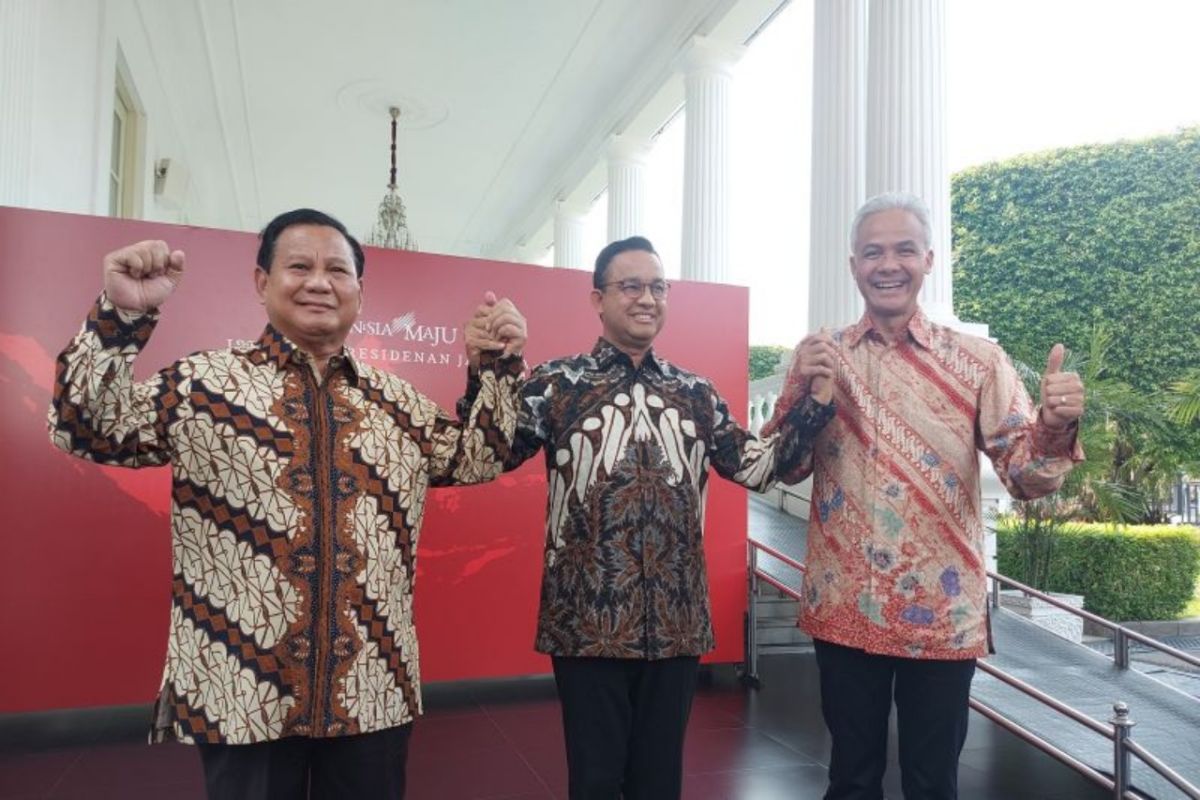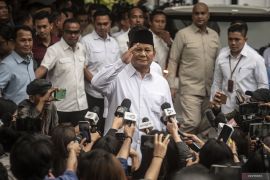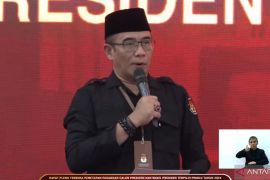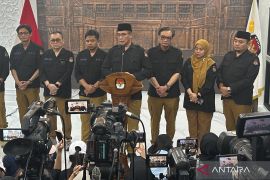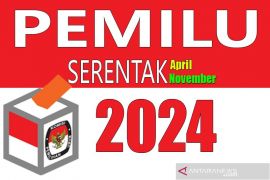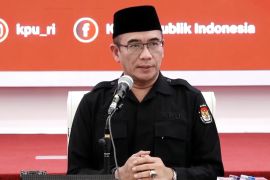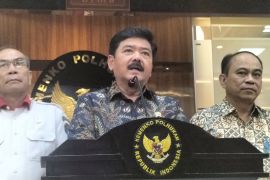Later, on the next day, the KPU assigned serial numbers for the pairs, with Baswedan-Iskandar claiming number one, Subianto-Raka clinching number two, and Pranowo-Mahfud possessing number three.
The three pairs are promoting their visions and missions that they will implement in the 2024-2029 period if they manage to clinch the top spots in the government next year.
All candidate pairs have introduced their visions and missions after submitting registration documents to the KPU. Baswedan-Iskandar and Pranowo-Mahfud pairs registered themselves on October 19, while Subianto-Raka pair did so on October 25.
Candidate pair number one carries the vision of “Just and Prosperous Indonesia for All” and the mission of “Eight Paths of Change.”
Candidate pair number two, on the other hand, promotes the vision of “An Advanced Indonesia Toward Golden Indonesia 2045”, while highlighting “Eight Missions of Asta Cita.”
Meanwhile, candidate pair number three offers the vision of “Towards a Superior Indonesia: Moving Quickly to Realize a Just and Sustainable Maritime Country” with “Eight Quick Moves” as the mission.
The visions and missions introduced by the pairs reflect their approaches to realize an equitable economy, alleviate poverty, handle unemployment issues, and manage economic gaps.
Related news: KPU announces 75-day campaign period for presidential candidates
Baswedan-Iskandar
The duo of Anies Baswedan and Muhaimin Iskandar, also known by their abbreviation “Amin,” has the backing of the National Democratic (NasDem) Party, National Awakening Party (PKB), Prosperous Justice Party (PKS), and Ummat Party.
To realize an equitable economy in Indonesia, the pair is offering several strategies, such as determining fair minimum wages that suit conditions in regions without burdening employers.
The pair number one has also voiced its aspiration of developing various cities as centers for growth in the hopes of narrowing gaps among regions.
Speaking about infrastructure, Baswedan and Iskandar have vowed to improve the quality of infrastructure in underdeveloped regions to facilitate more people to participate in productive economic activities.
They will also seek to enhance the people’s digital literacy, with the objective of enabling a broader population to make the most of developments in digital technology. They believe that by resolving the digital divide, Indonesia will be able to realize an equitable economy for its people.
Furthermore, it is written in the pair’s vision-mission document that they will strive to bolster the nation’s skills by conducting training and mentoring activities, especially in coastal, archipelagic, and inland regions, so that more people will have adequate capacity to take part in productive economic activities.
As for poverty alleviation, the Amin pair has prepared several strategies that involve providing the people with expanded access to running businesses and creating job opportunities, realizing fair wages, guaranteeing economic progress based on self-reliance and equality, and supporting national corporations to be successful at home and be able to compete at the global level.
Related news: Jokowi hosts lunch for three presidential candidates at Merdeka Palace
Subianto-Raka
Subianto and Raka have the support of the Great Indonesia Movement (Gerindra) Party, Party of Functional Groups (Golkar), National Mandate Party (PAN), Democratic Party, Crescent Star Party (PBB), Indonesian People's Wave (Gelora) Party, Garuda Party, Indonesian Solidarity Party (PSI), and Just and Prosperous People's Party (PRIMA).
Based on their vision and mission, they are committed to developing Indonesia by paying close attention to the welfare of people in villages, with the aim of realizing an equitable economy that will help the country guide its people to break free from the shackles of poverty.
According to the pair, in order for Indonesia to realize quality economic growth, it is vital to ensure that the entire population feels concrete benefits from the growth.
Subianto and Raka believe that efforts to strengthen the economic scale and institutionalize micro, small, and medium enterprises are crucial to evenly distribute the benefits of economic growth to all people.
They vowed to sustain programs related to the provision of easy access to credits for entrepreneurs and distribution of aid to the poor while offering a new credit program for startup companies and creating Health Indonesia Cards (KIS) specifically for elderly.
It is stated in the vision-mission document of Subianto and Raka that they are committed to continuing the implementation of the natural resources-based downstream and industrialization policies of the incumbent government to open more job opportunities for the sake of allowing economic justice to manifest.
Downstream refers to a process or strategy of a country to attach higher added values to its commodities. By downstreaming, a country will focus more on exporting processed or half-processed products rather than raw materials.
The candidate pair number two believes that by sustaining the natural resources-based downstream and industrialization policies, Indonesia will succeed in boosting its commodities’ values and creating more job vacancies.
Such policies will also result in beneficial economic and social multiplier effects for Indonesia, according to Subianto and Raka.
The pair seeks to execute downstreaming efforts by ensuring mastery of technology, empowering local talents, and taking into account environmental preservation.
Subianto and Raka’s resolve to sustain the downstream policy is driven by their belief that downstreaming efforts have proved to be instrumental in stimulating economic growth in natural resources-heavy regions and supporting the realization of an equitable economy and industrialization in eastern Indonesia.
If they are elected as president and vice president in 2024, they will expand the coverage of the downstream policy to bauxite, copper, tin, as well as agricultural and marine products, in addition to nickel.
Additionally, the pair has promised to strengthen Indonesia’s maritime sector to support the process of industrialization and development of a blue economy.
Related news: Civil servants asked not to press 'like' on election candidates' posts
Pranowo-Mahfud
Candidate pair number three has the support of the Indonesian Democratic Party of Struggle (PDI-P), United Development Party (PPP), Indonesian Unity Party (Perindo), and People's Conscience Party (Hanura).
Pranowo and Mahfud, according to their vision and mission, have devised strategies aimed at accelerating the realization of an equitable economy in the republic.
One of the strategies concerns their aspiration of building 10 million houses for the people and providing them with easy and affordable financing schemes, so they can own or rent the houses.
The pair is committed to finding strategic locations for developing the houses. According to their strategy, the houses will be constructed at locations accessible by means of mass transportation. People from the low-income bracket, informal sector workers, laborers, and youngsters are expected to be able to reap the benefits of living in such houses.
Furthermore, Pranowo and Mahfud have resolved to improve the quality of life of people residing in slums, both in rural and urban areas, by providing them with proper houses, healthy sanitation facilities, drinking water, public facilities, and sufficient area of open spaces.
As an effort to realize equitable economic development, they will also elevate the level of villages by doubling funds dedicated for rural areas. By doing so, they hope that at least 50 percent of villages in Indonesia would transform to become independent, prosperous, and superior.
Moreover, the pair number three has pledged to revitalize and build more traditional markets while developing more massive, comfortable, and cheaper means of public transport that can connect more people to their working places in the hopes of developing rural and urban areas simultaneously.
The pair also pays attention to the well-being of people in Papua's regions, saying that they will strive to handle economic and social gaps and elevate the living standards of locals by providing dedicated budgets, building more infrastructure, and offering tax incentives.
Meanwhile, the pair’s strategies to alleviate poverty are reflected in move number three and move number four in their “Eight Quick Moves” mission. Move number three pertains to the resolve to accelerate the development of knowledge- and added value-based independent economy, while the latter concerns the aim to expedite the realization of equitable economic development.
Related news: Harmony among candidates, supporters in elections crucial: President
Related news: Presidential candidates' plans for women and children: A closer look
Editor: Yuni Arisandy Sinaga
Copyright © ANTARA 2023
